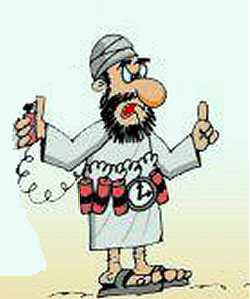Will the election go ahead, is the question on everyone’s lips.
The Sadrist movement was the first to announce its withdrawal when its leader, prominent Shiite holy man Moqtada
Tateral-Sadr
 ...hereditary Iraqi holy man and leader of a political movement in Iraq. He had his hereditary rival, al-Khoei, assassinated only a few hours after the holy rival's appearance out of exile in 2003. Formerly an Iranian catspaw, lately he's gagged over some of their more outlandish antics, then went back to catspawry...
...hereditary Iraqi holy man and leader of a political movement in Iraq. He had his hereditary rival, al-Khoei, assassinated only a few hours after the holy rival's appearance out of exile in 2003. Formerly an Iranian catspaw, lately he's gagged over some of their more outlandish antics, then went back to catspawry..., declared he will not run. "I announce that I am withdrawing my hand from all those who are working with this government, the current and the upcoming, even if they had allegiance to us, the family of Sadr," Sadr said in a televised speech.
Sadr does not hold elected position himself, but he leads the Sairoon coalition, parliament’s largest bloc.
The Iraqi Communist Party joined the Sadrist movement, calling on the masses not to vote because the elections lack the "slightest degree of integrity."
In the 2018 election, the Communist Party allied with Sairoon, collectively securing 54 seats.
On Wednesday, the Iraqi Platform, led by former prime minister Ayad Allawi, announced they too were dropping out of the race. A similar decision was made by the National Dialogue Front led by Sunni leader Salih al-Mutlaq.
Wael Abdel Latif, deputy head of the Iraqi Platform party, told Rudaw English on Thursday that with the presence of armed factions threatening the lives of activists, there is no room for fair elections. The electoral law in its current form may lead to internal war between those gangs, he added.
"The parties have the intention of fraud, and there are four million electoral cards that have been forged in advance. The state will not be able to confront the armed factions, even the United Nations
...an idea whose time has gone...
will not be able to monitor every electoral center in the country," Latif said.
Allawi, who headed the Iraqi government in 2004 — 2005, ran in the 2018 parliamentary elections as head of the National Coalition and won 21 of parliament’s 329 seats.
"We are fully convinced that these elections will be the worst elections in Iraq after 2003," Latif added.
The Iraqi National House, a new party formed by a group of Tishreen (October movement) protesters, also withdrew from the elections for the same reasons.
Hussain al-Gharabi, the party's front man, told Rudaw English on Thursday that despite government assurances about the elections, it is clear that the ruling political parties have no intention of creating a democratic environment for the vote.
"The conditions for holding the elections are not met, so the party decided to boycott, especially with the presence of uncontrolled weapons and impunity for killers of activists," Gharabi said.

 A suicide bomber on Sunday killed a deputy leader of an influential Iraqi Sunni Arab political party as he and other politicians met to discuss an upcoming provincial election, the party's leader said.
A suicide bomber on Sunday killed a deputy leader of an influential Iraqi Sunni Arab political party as he and other politicians met to discuss an upcoming provincial election, the party's leader said.